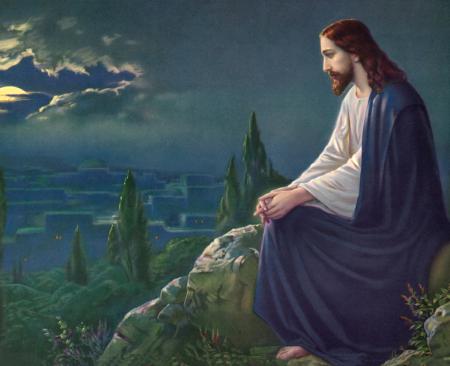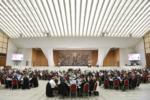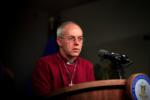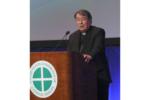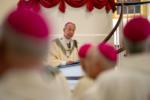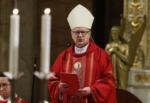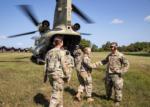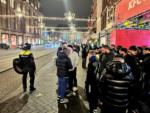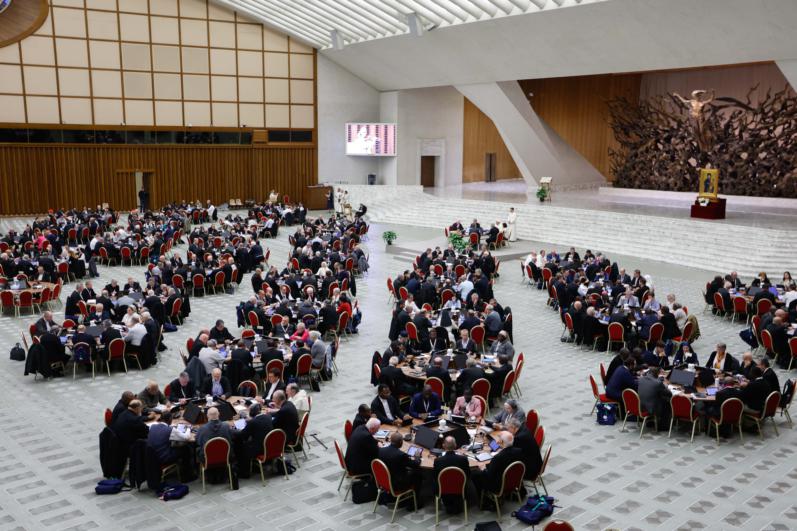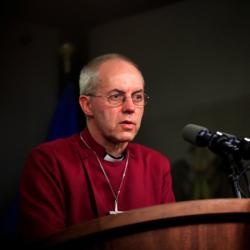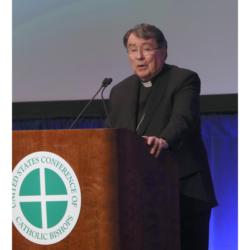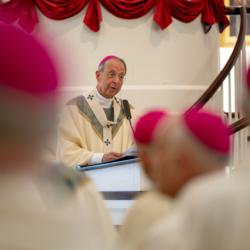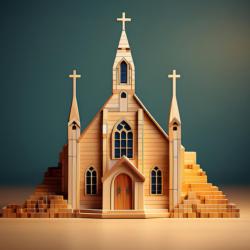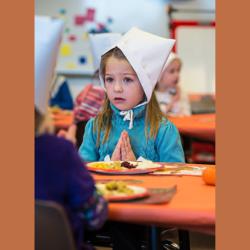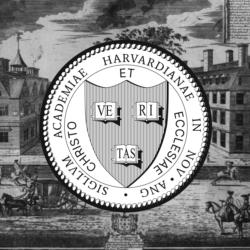Theological, ecclesiological balance needed in discussion of synodality, Bishop Rhoades says
VATICAN CITY (OSV News) -- For more than three years, the church has been undergoing a universal process of listening and dialogue, from the parish level to the national level to the halls of the Vatican itself.
This process, known familiarly now as "synodality," has culminated in two October sessions, during which more than 350 delegates from around the world have met, shared, prayed and discerned together. This 16th ordinary Synod of Bishops, subtitled formally as "For a Synodal Church: Communion, Participation, Mission," will wrap up at the end of this month.
On Oct. 11, toward the end of the second week, OSV News spoke with Bishop Kevin C. Rhoades of Fort Wayne-South Bend, Indiana, one of the bishop-delegates from the United States, about how the meeting was going at its halfway point.
OSV News: How are you finding this October's synod to be different from last October's?
Bishop Rhoades: First of all, I understand the methodology having experienced it last October. So in that sense, it's easier. They did make some changes last year with the 36 or so working groups. Each one gave a report to the whole assembly. That was rather tedious. So now that has been reduced, and they've organized it by language groups that get together the reporters of each of the language groups ... and then they make a presentation. So it's not 36 reports. Instead, it's like seven, which is much easier. And then that gives more time for the plenary assembly, the discussions where individuals are allowed to address the whole body. Also, I think it also allowed for more time in the working groups. So I think that was a definite improvement.
OSV News: What about relationships?
Bishop Rhoades: That's the most enjoyable part of the synod for me. Last year, I met a lot of delegates especially from Spain and Latin America because I was in Spanish-language groups. This year, it's all English. And so I'm meeting a lot of delegates that I didn't meet last year from Africa, Asia and Eastern Europe. That's probably what I enjoy the most. And it's just fascinating to learn about the church's life in different countries and how diverse our challenges are. At the same time, there are also common issues that we deal with. So you see things that we are all dealing with -- challenges in the world and in the church. But then you also see specific contexts where it really makes you, I think, build solidarity. I see the bishops from war-torn countries, for example. I've been sitting next to the Ukrainian major archbishop of Kiev and (discussing) the situation in Ukraine. And it makes us feel a closer bond in wanting to help spiritually and materially our brothers and sisters in these different countries.
One of the themes of the synod that's really been neat is called the exchange of gifts. And that was one of the subjects of our discussion in the last module. And I think that's a very rich concept -- that we have gifts to share with each other. I think, for example, in U.S. dioceses, including my own, where we have special relationship with the church in some dioceses of Africa, where there truly is an exchange of gifts. They will provide priests for us because we don't have enough. But then we will also provide -- I visited there, and so it develops a relationship -- financial help, but then a spiritual sharing and solidarity, even, between some of our Catholic schools here and there.
And I think that's a beautiful part of the catholicity of the church and then how we can perhaps engage more deeply and more fruitfully in that exchange of gifts, because we're all one body in Christ. And there's a beautiful diversity, and at the same time, there's a beautiful unity.
OSV News: Is there something that's happened this month that's inspiring you to try different things or to do things a different way back in your diocese?
Bishop Rhoades: The conversation in the spirit method, I think, has been very good. The idea of mutual discernment through prayer, making sure that when we have meetings where we're working at making decisions, that we do so in the light of prayer, reflection on the word of God, and that we listen respectfully to one another.
You know, I think sometimes we can tend to be too quick in trying to make decisions. We just want to get something out of the way. And that's not a good way to discern because prudence, the virtue of prudence, which is really good decision-making, requires time. I mean, sometimes you have to make a fast decision. It depends on what you're dealing with. But most of the time, there should be adequate time for reflection, for prayer and then to truly listen to every voice.
I think we can adapt the method according to local contexts. I think sometimes we can be a bit scattered in what we're talking about. I think sometimes there needs to be more focus on what you're discussing. I think that's one of the challenges of the synod is staying on point because sometimes we can, in our interventions, we can be all over the place. So I think that's a challenge for the synod leaders is to keep us focused. And I think that happens on other levels of the church as well. That we truly be focused, but that we respectfully listen to each other and that hopefully we learn from each other. And in the end, the decision that is taken is wiser and, most importantly, a true discernment of the will of God. I mean, that's what it's all about. It's discerning the will of God in particular situations.
And the hierarchy has a role in that, obviously, the bishop. But it's really important that we listen to the people, that we consult, that we engage others. At the same time, we do believe in the hierarchical constitution of the church. So ultimately, for the life of a bishop, he needs to listen, to consult and also, though, recognize the mission he has received in the decision-making for the diocese.
OSV News: What has Pope Francis' role been at the synod?
Bishop Rhoades: Pope Francis has been present for a number of the general congregations. And other than the homily that he gave at the opening Mass and at the penitential celebration, he hasn't really given any other addresses at this point, other than leading us in prayer. But he's there listening to the interventions.
OSV News: What does it mean, do you think, to have his presence there among the delegates?
Bishop Rhoades: It's very special to have the Holy Father there when he's able to be, because we know that he's practicing what he's preaching. He is there as the servant. He's there as the Bishop of Rome, the vicar of Christ, who is listening to the brother bishops and the other delegates. So I think that's a wonderful example for us.
OSV News: Some have expressed a concern that the synod is going to lead to conclusions that are too general and not specific enough. What do you think of that?
Bishop Rhoades: At this point, it's too early to tell. I think we're still in the middle. I think there is a sense that we need to be more concrete. But when you think about the first two modules, they were more on the theoretical side, because the first module was on the foundations. The second was on relations. Now this third has gotten a little more particular because it's on pathways. So it will be interesting to see, will we have actual concrete recommendations? I think so. I can't talk about what I anticipate those to be, but I think there will be.
OSV News: What has surprised you about the synod so far?
Bishop Rhoades: You hear so much about polarization in the church or a lot of almost antagonism. And really, I don't feel that at all at the synod. I really don't. I feel that our unity in Christ and as Catholics is prominent. I know that there are some who voiced things that I would disagree with, but it's always, you know, it's been extremely cordial. I don't know if I'd say that's surprising, maybe, but it's hopeful.
OSV News: What else has struck you about the synod?
Bishop Rhoades: I would add something I'd say on a theological level. I think it's important that we be balanced in our theology and, specifically, ecclesiology when it comes to the discussion of synodality. I think it's really important that we not just take some paragraphs from Vatican II documents in isolation from other ones. Because then I think we have a lopsided or a, it can be skewed, understanding of synodality. I think, for example, (there is) a lot of emphasis on the church as the people of God. And that's chapter two of "Lumen Gentium." And that's an important reality. But it shouldn't be an imbalanced ecclesiology because the church is also described by St. Paul and in the documents of the council as the body of Christ, and the temple of the Holy Spirit. The whole first chapter of "Lumen Gentium" is on the mystery of the church. Second chapter, people of God. The third chapter is on the hierarchical constitution of the church. And therefore, I think it's really important that we have a balanced, a whole ecclesiology, not a partial one. Because I think otherwise, this is not going to bear good fruit.
And I think that the importance of the sacrament of baptism has been highlighted, but we also have to remember that all the sacraments are ordered to the great sacrament, the Eucharist, and it's the Eucharist that makes the church. And there is a role for the sacrament of holy orders, where the priest represents Christ, the head and shepherd, high priest and bridegroom, of the church. So I just think the balance is really important. And the danger that I would see is an imbalance, if one is only focused on the image of the church as the people of God, or only on the sacrament of baptism. It has to be the complete vision of the Second Vatican Council, which was such a gift to the church. And that vision is also communicated in the Catechism of the Catholic Church.
OSV News: And that goes back to the role of decision-making.
Bishop Rhoades: Exactly. And formation is really important. That's a major theme that we had actually in our discussions today. And where does formation begin? It begins in the home. It's formation for discipleship, to be disciples of Christ. And that means being formed by the word of God, not by a majority opinion; being formed as disciples of Jesus Christ, who is the revelation of the Father.
And so when we speak about being formed as a synodal missionary church, we're almost presupposing that you're formed as disciples of Christ who are formed by his word, not by public opinion or other things.
OSV News: What is the danger if you go down the path of that kind of consensus?
Bishop Rhoades: Subjectivism. Loss of the truth -- it's relativism. Those are the dangers. And if we're truly going to be missionary and an evangelizing church, the world needs the good news of the Gospel. It doesn't need some political agenda. It needs the liberating truth of the Gospel. And we believe that truth has come to us, through the apostles and continues to be communicated in the Catholic Church.
OSV News: This synod is different from others in the past because there are people other than bishops who can vote. What are your thoughts on that?
Bishop Rhoades: I would say probably three-quarters of the voting delegates are bishops and one-quarter are not bishops. I've really enjoyed getting to know all the delegates, bishops and laity and religious, and I think with this being a consultative body to the pope, he's decided to have a quarter of the delegate voting delegates be non-bishops. I think that does raise questions about the episcopal office in relationship to synodality. I think it has raised some questions, but I think in the end, a synod of bishops is not a decision-making body. It's a consultative body that the pope uses. So, therefore, I wouldn't call it an exercise of the episcopal magisterium in that sense, otherwise it would be exclusively bishop members.
